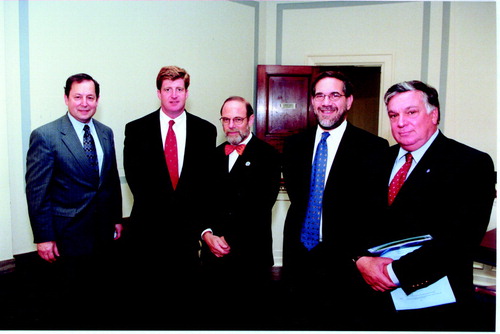APA Joins House Members To Educate Staff On Mental Illness
 “Nothing happens until someone sells something,” the adage goes. And no one apparently knows that better than the House of Representatives Working Group on Mental Illness, cosponsored by Rep. Marge Roukema (R-N.J.) and Rep. Peter DeFasio (D-Ore.) and made up of 17 other members of Congress.
“Nothing happens until someone sells something,” the adage goes. And no one apparently knows that better than the House of Representatives Working Group on Mental Illness, cosponsored by Rep. Marge Roukema (R-N.J.) and Rep. Peter DeFasio (D-Ore.) and made up of 17 other members of Congress.
The group decided to organize a Capitol Hill briefing luncheon for June 20, which would include not just tasty fare, but also some of the big guns in mental health. The idea was to attract Capitol Hill staffers who were hungry for both a good luncheon and for information about mental illness.
To fulfill its aim, the group turned to APA for support, which the Association enthusiastically provided. APA helped with the logistics for the luncheon, and sent Darrel Regier, M.D., executive director of APA’s Office of Research, to serve as briefing moderator. Regier is also director of the American Psychiatric Institute for Research and Education.
 The group also recruited some other major figures in the mental health field to serve as speakers. They were Benedetto Sarceno, M.D., an Italian psychiatrist and director of mental health and substance dependence at the World Health Organization; Steven Hyman, M.D., director of the National Institute of Mental Health; and Bernard Arons, M.D., director of the Center for Mental Health Services at the Substance Abuse and Mental Health Services Administration.
The group also recruited some other major figures in the mental health field to serve as speakers. They were Benedetto Sarceno, M.D., an Italian psychiatrist and director of mental health and substance dependence at the World Health Organization; Steven Hyman, M.D., director of the National Institute of Mental Health; and Bernard Arons, M.D., director of the Center for Mental Health Services at the Substance Abuse and Mental Health Services Administration.
The luncheon briefing, as the working group had hoped, turned out to be a big success. Far more Hill staffers came than expected; some 90 people attended the luncheon. The staffers also listened with interest to what the speakers had to say. Some examples:
There are more than 400 million people in the world suffering from neuropsychiatric conditions, Sarceno reported. Twenty-five percent of the world’s population are affected by mental and behavioral disorders at some point in their lives. Mental and neurological disorders account for 12 percent of the total global burden of disease, and by 2020, this 12 percent is expected to increase to 15 percent, which would then be larger than the world’s cancer incidence.
Stigma against mental illness is universal, he continued. “How many of you,” he asked, “would say, ‘I am not coming into work for 15 days because I am being treated for depression’?”
And while the medical knowledge to successfully treat a number of mental illnesses exists, he added, there is a lack of rational application of treatment in many countries. For instance, too many countries, mostly developed ones, still spend most of their resources on a few large mental asylums that focus on a small fraction of those who need treatment, and 38 percent of countries do not have any community care for people with mental illness. What’s more, 43 percent of countries do not have a mental health policy, and 23 percent have not enacted mental health legislation. Thus, policymakers around the world need to be educated about what needs to be done to help persons with mental illness and convinced that they should implement it.
“It is an extraordinarily exciting time to be doing mental health research,” Hyman declared. “Scientists are flocking to the cause.” For instance, there are now, for the first time, neuroimaging techniques to see the living human brain. The human genome project has given investigators a platform on which to stand. But while psychiatric researchers are looking toward the future, not enough of what is already known about diagnosing and treating mental illness is reaching people in the U.S. and other countries, he stressed.
Throughout the years, Arons pointed out, Surgeon Generals’ reports about health have had some profoundly positive effects on the health of Americans, for instance, the one about the dangers of cigarette smoking. Thus, the Surgeon General’s 1999 report on mental health can also be used for similarly good purpose, he contended. “What you should do,” he urged, “is hold a town meeting in your Congressional district and invite the Surgeon General to speak. . . .”
Hill staffers had a chance to ask questions after the talks. One asked, for example, “Has the NIMH been getting its fair share of research dollars during the past few years?,” and another wanted to know “What is WHO doing regarding cultural differences in mental health?”
Rep. DeFasio told the group that although the Mental Health Parity Act of 1996 sunsets this September, he hopes that he and other members of Congress can not only reauthorize it, but also get legislation that is “more enforceable.” And as working group member Rep. Patrick Kennedy (D-R.I.) asserted, funding for NIMH research “needs to be increased dramatically.”
The briefing was such a success that the working group is planning more. The next one is scheduled to include a patient’s presentation of what it’s like to live with mental illness; what it’s like to treat mental illness; and some of the new developments in mental health research. ▪



